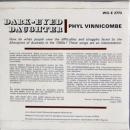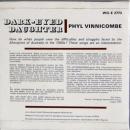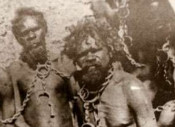Mother may I go out to swim?
Yes my dark-eyed daughter,
Mother I would go out to swim
but at the pool I can't get in,
Because of the colour of my skin
because I'm your dark-eyed daughter.
Mother may I go to the show?
Yes my dark-eyed daughter.
Mother tell me do you know
which side of the theatre I should go?
Go where the colour of your skin won't show
my darling dark-eyed daughter.
Mother will I go to school?
Yes my dark-eyed daughter.
Mother when I go to school
will the children treat me cruel?
Children follow their parents' rule
my darling dark-eyed daughter.
Mother when will all this end?
I don't know my daughter.
Maybe it will end the day
when heaven and earth will pass away
And we will hear a great voice say
you're welcome here …… my daughter.
Yes my dark-eyed daughter,
Mother I would go out to swim
but at the pool I can't get in,
Because of the colour of my skin
because I'm your dark-eyed daughter.
Mother may I go to the show?
Yes my dark-eyed daughter.
Mother tell me do you know
which side of the theatre I should go?
Go where the colour of your skin won't show
my darling dark-eyed daughter.
Mother will I go to school?
Yes my dark-eyed daughter.
Mother when I go to school
will the children treat me cruel?
Children follow their parents' rule
my darling dark-eyed daughter.
Mother when will all this end?
I don't know my daughter.
Maybe it will end the day
when heaven and earth will pass away
And we will hear a great voice say
you're welcome here …… my daughter.
Contributed by Dq82 - 2018/1/5 - 11:56
Language: Finnish
Traduzione finlandese / Finnish translation / Traduction finnoise / Suomennos: Juha Rämö
TUMMASILMÄINEN TYTÄR
Äiti, saanko mennä uimaan?
Saat, tummasilmäinen tyttäreni.
Äiti, haluaisin mennä uimaan,
mutta minua ei päästetä altaalle
ihonvärini takia, siksi, että
olen tummasilmäinen tyttäresi.
Äiti, saanko mennä elokuviin?
Saat, tummasilmäinen tyttäreni.
Äiti, osaatko sanoa, mille puolelle
teatteria minun pitää mennä?
Mene sinne, missä ihonvärisi ei näy,
tummasilmäinen tytärkultani.
Äiti, menenkö minä kouluun?
Menet, tummasilmäinen tyttäreni.
Äiti, kun menen kouluun,
kohtelevatko lapset minua julmasti?
Lapset tekevät niin kuin vanhemmat käskevät,
tummasilmäinen tytärkultani.
Äiti, milloin kaikki tämä päättyy?
En tiedä, tyttäreni.
Ehkä se päättyy sinä päivänä,
kun taivas ja maa katoavat
ja kuulemme suuren äänen sanovan:
Tänne olet tervetullut ..... tyttäreni.
Äiti, saanko mennä uimaan?
Saat, tummasilmäinen tyttäreni.
Äiti, haluaisin mennä uimaan,
mutta minua ei päästetä altaalle
ihonvärini takia, siksi, että
olen tummasilmäinen tyttäresi.
Äiti, saanko mennä elokuviin?
Saat, tummasilmäinen tyttäreni.
Äiti, osaatko sanoa, mille puolelle
teatteria minun pitää mennä?
Mene sinne, missä ihonvärisi ei näy,
tummasilmäinen tytärkultani.
Äiti, menenkö minä kouluun?
Menet, tummasilmäinen tyttäreni.
Äiti, kun menen kouluun,
kohtelevatko lapset minua julmasti?
Lapset tekevät niin kuin vanhemmat käskevät,
tummasilmäinen tytärkultani.
Äiti, milloin kaikki tämä päättyy?
En tiedä, tyttäreni.
Ehkä se päättyy sinä päivänä,
kun taivas ja maa katoavat
ja kuulemme suuren äänen sanovan:
Tänne olet tervetullut ..... tyttäreni.
Contributed by Juha Rämö - 2018/1/11 - 23:18
×
![]()
Note for non-Italian users: Sorry, though the interface of this website is translated into English, most commentaries and biographies are in Italian and/or in other languages like French, German, Spanish, Russian etc.






Dark-eyed daughter
Pubblicato con il nome Phyl Vinnicombe (Lobl è il cognome da sposata)
'The 1967 referendum in which 90% of the Australian Community voted in favour of deleting sections of the Constitution discriminating against Aborigines showed goodwill. To enable Aborigines to become independent, self-reliant people this goodwill must be translated into active and positive attitudes. Together we must build a nation where dark and white live in harmony with growing understanding and respect for one another, mutually contributing to the enrichment of our Commonwealth. This is the challenge of these songs and of the present day Aboriginal advancement movement.'
This is still the challenge but now many aboriginal people show us the value of their culture, they show us the meaning of resilience, they show us the way ahead, they show us how to forgive, they show us their worth.
However the journey for too many of our First People is still hard and slow. When I see the positive stories that do emerge I feel vindicated but humbled by their willingness to accept and continue the struggle. In this new era of recognition there is still a need for deeper more positive acceptance of responsibility by us all to give value to their existence and to be of assistance. I ask if anyone finds the material on this site to be useful, and are grateful, that they make a donation to an Australian indigenous project or organization.
My first recorded song, almost my first song, was sparked by media coverage of the student bus ride led by Charles Perkins and University students in 1965.
An old traditional rhyme gave a frame for the song.
'Mother may I go out to swim?'
'Yes my darling daughter.
Hang your clothes on a Hickory limb,
But don’t go near the water.'
The last verse of the song was born not from a belief, but from realisation and dismay that many of those who did profess to believe could also hold racist views.